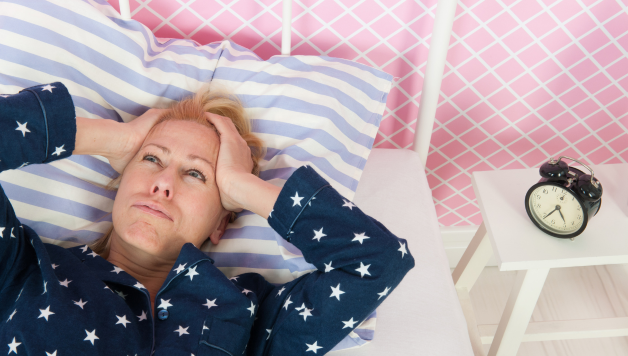Key Takeaways:
- Menopause can disrupt sleep patterns and cause insomnia.
- Menopause insomnia includes difficulty falling asleep and frequent awakenings.
- Good sleep hygiene and a healthy lifestyle can help manage menopause insomnia.
- Relaxation techniques and seeking medical advice are additional options.
- Maintain a regular sleep schedule and create a sleep-friendly environment for better sleep during menopause.
Are you a woman going through menopause and experiencing trouble sleeping due to menopause insomnia? If so, you’re not alone. Many women find that their sleep patterns are disrupted during this transitional phase. This article will explore the connection between menopause and insomnia, understand its symptoms, and discover practical ways to manage sleep problems. Let’s dive in!
The Impact of Menopause on Sleep
Menopause is a natural process marking the end of a woman’s reproductive years. During this time, the body undergoes significant hormonal change, i.e., a decline in estrogen and progesterone levels. These hormonal fluctuations can affect a woman’s health, including sleep.
Understanding Menopause Sleep Insomnia
Insomnia, a common sleep disorder, refers to difficulties falling asleep, staying asleep, or experiencing non-restorative sleep. During menopause, hormonal changes can disrupt the sleep-wake cycle and lead to insomnia. Let’s briefly examine the symptoms and causes of menopause-related insomnia.
Symptoms of Menopause Sleep Insomnia
- Difficulty Falling Asleep: Many women are going through menopause, thus, finding it challenging to fall asleep at night, even when they are tired.
- Nighttime Awakenings: Women may wake up frequently throughout the night, making it difficult to achieve deep, restful sleep.
- Early Morning Awakening: Some women with menopause insomnia wake up earlier than desired and have trouble falling back asleep.
- Non-Restorative Sleep: Despite spending adequate time in bed, women with menopause insomnia may not feel refreshed upon waking and experience daytime sleepiness.
Causes of Menopause Sleep Insomnia
Several factors contribute to menopause-related insomnia. Here are the primary causes:
- Hormonal Changes: Fluctuating levels of hormones such as estrogen and progesterone can disrupt the natural sleep pattern, leading to insomnia.
- Hot Flashes and Night Sweats: Menopausal symptoms like hot flashes and sweating at night can be disruptive. Moreover, it makes it challenging to sleep through the night.
- Psychological Factors: Emotional changes, such as increased stress, anxiety, or mood swings during menopause, can contribute to insomnia.
- Lifestyle Factors: Unhealthy lifestyle habits, including a lack of physical activity, poor diet, excessive caffeine intake, and irregular sleep schedules, can worsen menopause insomnia.
Managing Menopause Insomnia
While menopause insomnia can be frustrating, several strategies can improve sleep quality. Here are some practical ways to manage menopause-related insomnia:
Sleep Hygiene Practices
- Stick to a Regular Sleep Schedule: Practice regular timings of going to bed and waking up each day to regulate your body’s internal clock.
- Create a Soothing Bedtime Routine: Engage in relaxing techniques before bed, such as reading a book or practising deep breathing exercises.
- Create a Sleep-friendly Environment: Make your bedroom a comfortable and calming space, ensuring it is dark, cool, and quiet.
Lifestyle Modifications
- Regular Exercise: Engage in moderate physical activity during the day, as it can improve sleep quality and reduce menopause symptoms.
- Healthy Diet: Eat a balanced diet rich in fruits, vegetables, whole grains, and lean proteins. Limiting the consumption of caffeine, especially in the evening, is beneficial.
- Stress Management: Practice stress-reducing techniques such as mindfulness, meditation, or yoga to promote relaxation and better sleep.
Behavioural Techniques
- Stimulus Control Therapy: Create associations between your bed and sleep by reserving your bed only for sleep and intimacy. Avoid stimulating activities in bed, such as watching TV or using electronic devices.
- Relaxation Techniques: Practice relaxation exercises, such as progressive muscle relaxation or guided imagery, before bed to calm your mind and prepare for sleep.
Seeking Medical Advice
If self-help strategies do not alleviate your menopause insomnia, it may be beneficial to seek medical advice. A healthcare professional can evaluate your sleep patterns, recommend appropriate treatments, or explore the possibility of hormone therapy or other medications to manage your symptoms effectively.
Menopause can bring about various changes in a woman’s life, including disruptions in sleep patterns. Menopause insomnia, characterised by difficulties falling asleep, frequent awakenings, and non-restorative sleep, is a common sleep disorder experienced by many women during this phase. By understanding the causes and symptoms of menopause insomnia and implementing effective management strategies such as sleep hygiene practices, lifestyle modifications, and behavioural techniques, women can find relief and improve their sleep quality. Remember, if your sleep problems persist, it’s better to consult with a healthcare professional. He can provide personalized advice and guide you towards better sleep and overall well-being during menopause.









